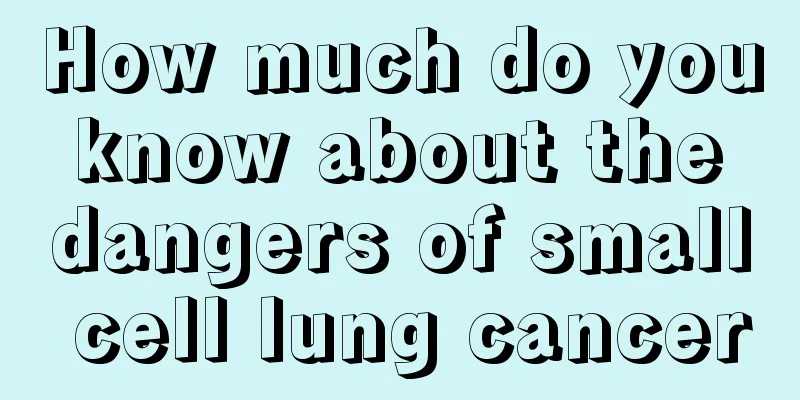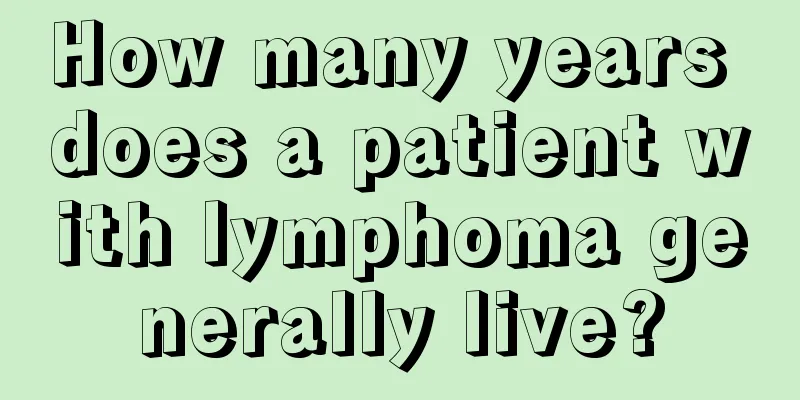How much do you know about the dangers of small cell lung cancer

|
When small cell lung cancer first occurs, we do not find obvious physical symptoms. Therefore, most patients with small cell lung cancer are generally in the middle or late stages. This increases the threat of small cell lung cancer to patients and also creates a great psychological burden for patients. Even if the harm of small cell lung cancer is very great, we must face it. So how much do you know about the harm of small cell lung cancer? If you want to understand the dangers of small cell lung cancer, you must first understand the symptoms of middle and late stage small cell lung cancer. 1. Pain The appearance of pain often indicates that the cancer has entered the middle or late stages. At first, it is usually dull pain or dull pain, which is more obvious at night. Later, it gradually worsens and becomes unbearable, and it continues day and night. Severe pain is a symptom of the late stage of small cell lung cancer. If it occurs, it is usually controlled by drugs. Pain is generally caused by cancer cells invading the nerves. Many people feel extremely painful in the late stages. 2. Bleeding It is caused by cancer tissue invading blood vessels or rupture of small blood vessels in cancer tissue. For example, lung cancer patients may cough up blood and have blood in sputum. Patients with stomach, colon, and esophageal cancer may have blood in their stool. 3. Lump It is mainly manifested by the malignant proliferation of cancer cells, which can be felt by hand on the surface or deep inside the body. Cancer of the thyroid, parotid or breast can be felt in the shallow part of the subcutaneous area. Tumor metastasis to lymph nodes can cause lymph node enlargement. Some superficial lymph nodes, such as cervical lymph nodes and axillary lymph nodes, are easy to feel. Such symptoms become increasingly harmful to small cell patients as the disease worsens. 1. It can cause tracheal obstruction in the patient, the disappearance of normal alveolar sac cavities, and affect the exchange of oxygen and carbon dioxide. The patient will feel chest tightness and shortness of breath. 2. Cancer can also make the patient unable to exclude bacteria, leading to pneumonia and fever. This type of pneumonia is called obstructive pneumonia. 3. Chest pain is one of the more common hazards of lung cancer. Pleural effusion may also occur. Excessive pleural effusion compresses the lungs, making it more difficult for the patient to breathe, and is quite difficult to treat. 4. If the lung tumor occupies a large part of lung cancer, it will seriously threaten the patient's breathing. 5. The occurrence of lung cancer seriously threatens the patient's life. 6. The nerves in the bronchi are quite sensitive. Cancer can irritate the bronchi, causing the patient to cough. If the condition persists for a long time, the patient may also develop symptoms of coughing up blood. The above is my introduction to the dangers of small cell lung cancer. I hope it will be helpful to you. |
<<: What are the common symptoms of small cell lung cancer
>>: A comprehensive analysis of the hazards of small cell lung cancer
Recommend
Can people with stomach problems drink soy milk? People with stomach problems must know this
In recent years, as people's life pressure ha...
The best way to remove free radicals
There are many best ways to eliminate free radica...
If your chest hurts from coughing, here are 5 ways to treat it
Coughing is a symptom of respiratory diseases. Co...
How often should I have a cystoscopy after bladder cancer surgery?
Cystoscopy is recommended for follow-up after bla...
Symptoms of von Willebrand disease
Von Willebrand disease is a common hereditary ble...
Fear of strange environments
When people are in an unfamiliar environment, mos...
How long can you live with early stage bladder cancer
How long can a patient with early bladder cancer ...
Does having fine foamy urine mean kidney disease?
In the hospital, you often hear people ask doctor...
What to do if the face hurts when welded
Electric welding is a very dangerous job. If stri...
What should I do if I get tanned during military training
After military training, many people's skin w...
What are the treatment methods for potential complications of esophageal cancer?
Surgery has always been the traditional treatment...
Why is my face crooked in photos
In life, many people like to take photos, but som...
How to tell if the eardrum is ruptured
There are many things that we cannot see with our...
Can I drink iced tea if I have skin allergies
I believe many of my friends prefer to drink iced...
How much does a colorectal cancer test cost
We know that colonoscopy screening can detect col...









